How To Be A Real Moroccan Chef
In the culinary realm of Morocco, aspiring chefs can embark on a journey to unravel the secrets of becoming a genuine Moroccan chef. While the notion of traditional cooking may seem antiquated in today’s fast-paced world, the essence of Moroccan cuisine transcends time, offering a unique blend of flavors and techniques that captivate the senses.
But what does it truly take to master the art of Moroccan cooking and embrace its cultural heritage? The answer lies in a combination of passion, dedication, and a deep appreciation for the vibrant tapestry of flavors that define this rich culinary tradition.
Key Points
- Embrace traditional cooking techniques for authentic Moroccan flavors.
- Master the art of tagines and couscous to showcase cultural heritage.
- Use essential Moroccan ingredients and spices for genuine taste.
- Explore local markets for fresh ingredients and deeper culinary insights.
Moroccan Culinary Heritage
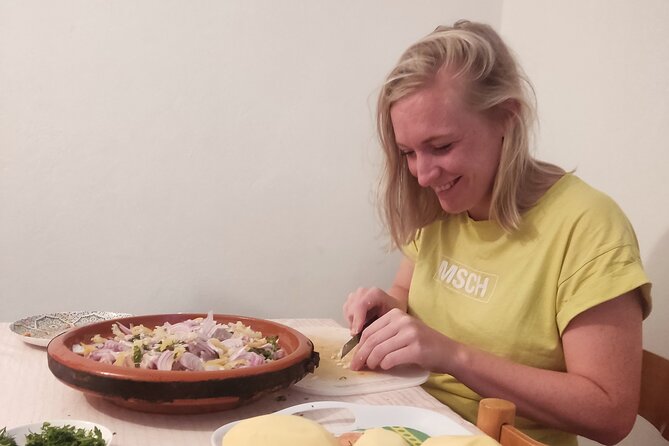
Moroccan culinary heritage boasts a rich tapestry of flavors and techniques that have been passed down through generations, embodying a vibrant fusion of spices and traditions.
Exploring cultural influences reveals the intricate blend of Arab, Berber, Moorish, French, and Spanish elements that have shaped Moroccan cuisine into the diverse and flavorful gastronomy it’s today.
Culinary workshops abroad offer enthusiasts the opportunity to explore this rich culinary tradition firsthand, learning the art of preparing tagines, couscous, and pastries under the guidance of skilled local chefs.
These immersive experiences not only teach the techniques but also provide insight into the cultural significance of each dish, creating a deeper appreciation for the history and complexity of Moroccan culinary practices.
Essential Ingredients and Spices
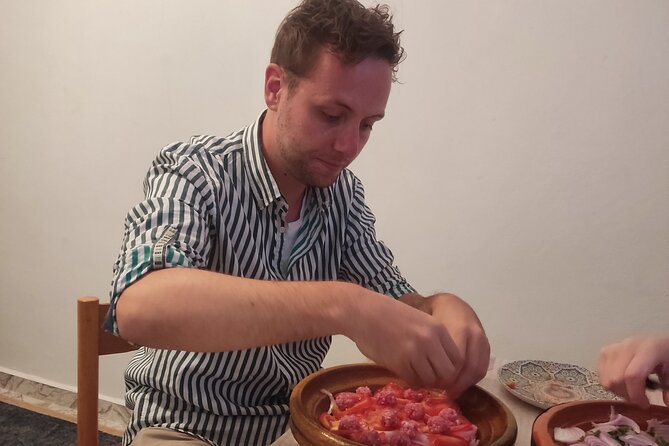
Exploring the vibrant culinary heritage of Morocco unveils a world of essential ingredients and spices that form the backbone of traditional dishes, infusing each recipe with a unique depth of flavor and cultural significance.
When delving into Moroccan cuisine, visiting local markets is essential to procure fresh and authentic ingredients like saffron, cumin, and paprika. These flavorful condiments are fundamental in creating the rich and aromatic taste profiles that define Moroccan cooking. Spices such as cinnamon, ginger, and turmeric add layers of complexity to tagines and couscous dishes.
Plus, preserved lemons, olives, and argan oil are staples that bring a distinct North African flair to the cuisine. Embracing these key elements guarantees an authentic Moroccan culinary experience.
Traditional Cooking Techniques
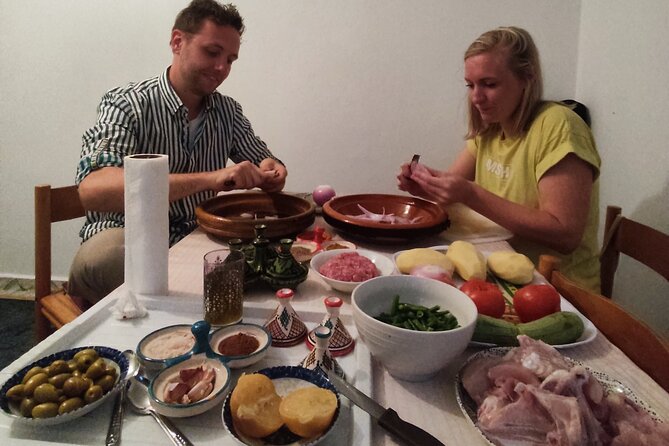
To master the art of Moroccan cuisine, aspiring chefs must hone traditional cooking techniques that have been passed down through generations, ensuring authenticity in every dish they create. These techniques have evolved over time, reflecting the rich tapestry of Moroccan culture and culinary traditions.
When delving into Moroccan cooking, chefs should pay special attention to regional specialties, each area offering its unique twist on traditional dishes. Understanding the history behind these cooking methods provides a deeper connection to the roots of Moroccan gastronomy.
Mastering Tagines and Couscous
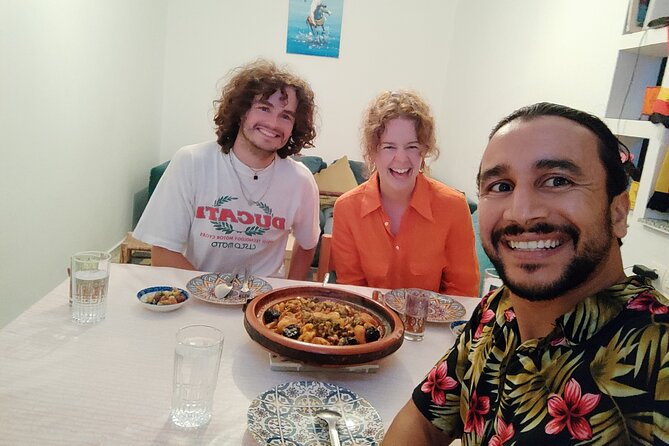
Mastering the intricate art of preparing tagines and couscous unlocks a world of flavor and cultural significance within Moroccan cuisine.
Tagines, named after the earthenware pot they’re cooked in, are slow-cooked stews that epitomize Moroccan hospitality. The blend of sweet and savory flavors in tagines reflects the diverse cultural influences that have shaped Moroccan cuisine over the centuries.
Couscous, on the other hand, is a staple dish made from steamed semolina grains, often served with vegetables, meat, or fish. Chefs can put modern twists on traditional recipes by experimenting with ingredients and techniques, leading to innovative fusion cuisine that still honors the authentic Moroccan flavors.
Mastering these dishes isn’t just about cooking; it’s about embracing a rich culinary heritage.
Creating Authentic Moroccan Flavors
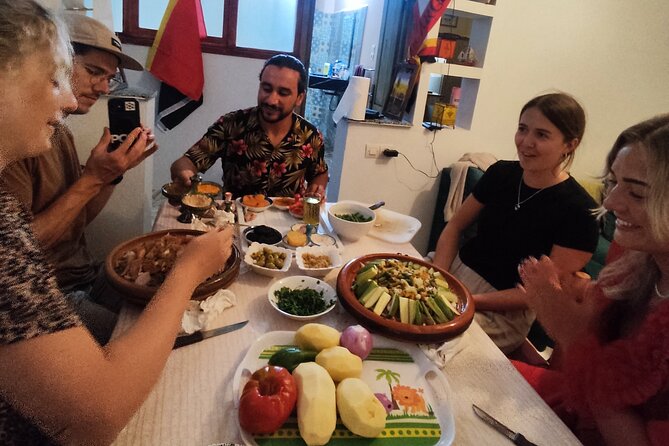
Unlock the vibrant essence of Moroccan cuisine by infusing your dishes with authentic flavors that capture the heart of this rich culinary tradition. To achieve this, one must explore the culinary secrets of Morocco by exploring local markets and sourcing the finest ingredients.
Here are three essential steps to help you create truly authentic Moroccan flavors:
-
Exploring Local Markets: Visit bustling souks and markets to discover an array of spices, fresh herbs, and unique ingredients that are essential for Moroccan cooking.
-
Culinary Secrets: Learn from local chefs and vendors about traditional cooking techniques, flavor combinations, and the art of balancing sweet, savory, and tangy flavors in Moroccan dishes.
-
Quality Ingredients: Invest in high-quality spices, olive oil, preserved lemons, and other key components to elevate the authenticity of your Moroccan creations.
Tips for Perfecting Moroccan Dishes

For those looking to elevate their Moroccan cooking skills, incorporating traditional techniques and key ingredients is essential for achieving authentic and flavorful dishes. To perfect Moroccan dishes, here are some cooking secrets and culinary traditions to keep in mind:
-
Slow Cooking: Many Moroccan dishes benefit from slow cooking methods that allow flavors to develop fully. Take your time and let the ingredients simmer together for the best results.
-
Balancing Flavors: Moroccan cuisine is known for its unique blend of sweet, savory, and spicy flavors. Pay attention to the balance of these elements in your dishes to create a harmonious taste experience.
-
Fresh Ingredients: Using fresh herbs, spices, and high-quality meats is crucial for authentic Moroccan flavors. Seek out traditional ingredients like saffron, cumin, and preserved lemons for an authentic touch.
Common questions
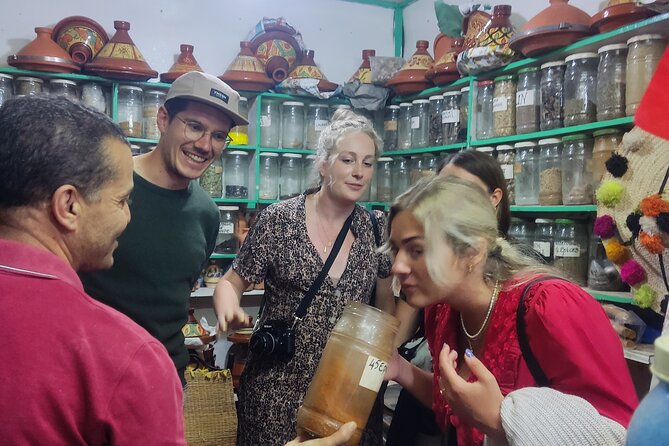
How Can I Best Preserve the Authenticity of Moroccan Flavors When Cooking in a Non-Traditional Kitchen or Setting?
To preserve Moroccan flavors in non-traditional settings, use local spices for authenticity. Experiment with ingredient substitutions for fusion cuisine. Balance flavors carefully. Enhance presentation techniques. Adapt traditional recipes creatively. Embrace the essence of Moroccan cuisine while innovating.
Are There Any Specific Cultural Customs or Traditions That Should Be Observed While Preparing Moroccan Dishes?
When preparing Moroccan dishes, cultural etiquette plays a crucial role. Respect traditions like washing hands before cooking. Use traditional cooking techniques for authentic flavors. Ingredient substitutions should be done mindfully to maintain the dish’s essence.
What Are Some Common Mistakes That Beginners Make When Attempting Moroccan Cooking, and How Can They Be Avoided?
Beginners often make mistakes in Moroccan cooking by incorrect ingredient substitutions, neglecting traditional techniques, and failing to balance flavors. To avoid these errors, follow cooking tips, respect authenticity, and taste frequently.
Are There Any Regional Variations in Moroccan Cuisine That Aspiring Chefs Should Be Aware Of?
Regional influences play a significant role in Moroccan cuisine, shaping flavors and ingredients. Aspiring chefs should explore diverse culinary techniques from areas like the coast, mountains, and desert to truly understand the rich tapestry of Moroccan gastronomy.
How Can I Adapt Traditional Moroccan Recipes to Accommodate Dietary Restrictions or Preferences, Such as Vegetarian or Gluten-Free Diets?
To adapt traditional Moroccan recipes for dietary needs, one can make ingredient substitutions, like using chickpeas for protein in tagine. Explore various cooking techniques and presentation styles to maintain authentic flavors while catering to preferences.
Last Words
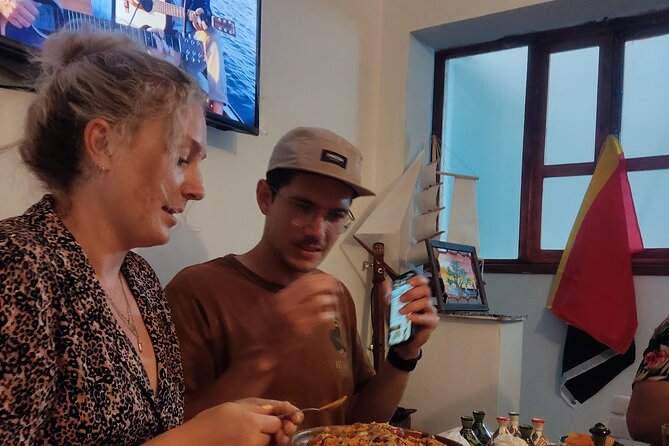
Set out on a culinary journey through the vibrant markets and rich flavors of Morocco with the guidance of a seasoned chef.
From mastering traditional cooking techniques to creating authentic Moroccan dishes, this immersive experience offers a taste of the country’s culinary heritage.
With personalized attention and a focus on authenticity, aspiring chefs can hone their skills and explore the diverse and delicious world of Moroccan cuisine.
Get ready to become a real Moroccan chef and dazzle your taste buds!